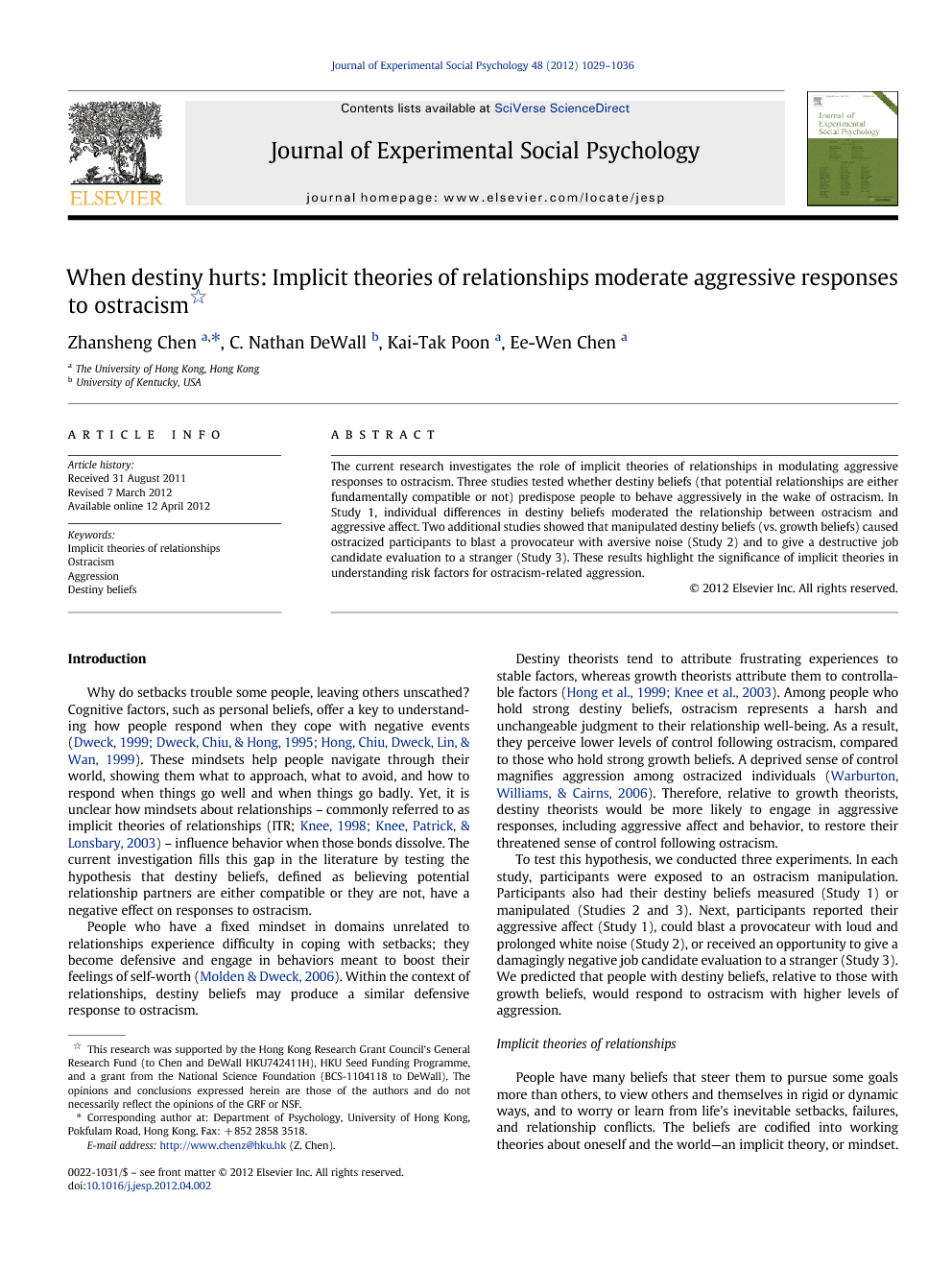The current research investigates the role of implicit theories of relationships in modulating aggressive responses to ostracism. Three studies tested whether destiny beliefs (that potential relationships are either fundamentally compatible or not) predispose people to behave aggressively in the wake of ostracism. In Study 1, individual differences in destiny beliefs moderated the relationship between ostracism and aggressive affect. Two additional studies showed that manipulated destiny beliefs (vs. growth beliefs) caused ostracized participants to blast a provocateur with aversive noise (Study 2) and to give a destructive job candidate evaluation to a stranger (Study 3). These results highlight the significance of implicit theories in understanding risk factors for ostracism-related aggression.
Why do setbacks trouble some people, leaving others unscathed? Cognitive factors, such as personal beliefs, offer a key to understanding how people respond when they cope with negative events (Dweck, 1999, Dweck et al., 1995 and Hong et al., 1999). These mindsets help people navigate through their world, showing them what to approach, what to avoid, and how to respond when things go well and when things go badly. Yet, it is unclear how mindsets about relationships – commonly referred to as implicit theories of relationships (ITR; Knee, 1998 and Knee et al., 2003) – influence behavior when those bonds dissolve. The current investigation fills this gap in the literature by testing the hypothesis that destiny beliefs, defined as believing potential relationship partners are either compatible or they are not, have a negative effect on responses to ostracism.
People who have a fixed mindset in domains unrelated to relationships experience difficulty in coping with setbacks; they become defensive and engage in behaviors meant to boost their feelings of self-worth (Molden & Dweck, 2006). Within the context of relationships, destiny beliefs may produce a similar defensive response to ostracism.
Destiny theorists tend to attribute frustrating experiences to stable factors, whereas growth theorists attribute them to controllable factors (Hong et al., 1999 and Knee et al., 2003). Among people who hold strong destiny beliefs, ostracism represents a harsh and unchangeable judgment to their relationship well-being. As a result, they perceive lower levels of control following ostracism, compared to those who hold strong growth beliefs. A deprived sense of control magnifies aggression among ostracized individuals (Warburton, Williams, & Cairns, 2006). Therefore, relative to growth theorists, destiny theorists would be more likely to engage in aggressive responses, including aggressive affect and behavior, to restore their threatened sense of control following ostracism.
To test this hypothesis, we conducted three experiments. In each study, participants were exposed to an ostracism manipulation. Participants also had their destiny beliefs measured (Study 1) or manipulated (Studies 2 and 3). Next, participants reported their aggressive affect (Study 1), could blast a provocateur with loud and prolonged white noise (Study 2), or received an opportunity to give a damagingly negative job candidate evaluation to a stranger (Study 3). We predicted that people with destiny beliefs, relative to those with growth beliefs, would respond to ostracism with higher levels of aggression.
Many people believe in “star-crossed” lovers, drawn together by destiny. Our findings suggest that such a mindset leads people to behave aggressively in the aftermath of ostracism. Ostracized destiny theorists showed an emotional and behavioral profile marked by elevated hostility and aggression, both toward their provocateurs and strangers. Although our findings are agnostic about whether destiny is itself a reality, they suggest that merely believing in destiny can prove disastrous in predicting aggression following ostracism.


